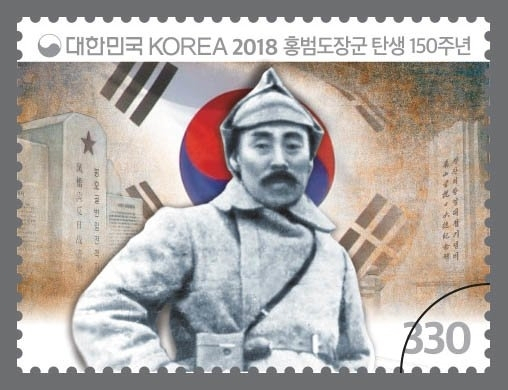 |
This file photo shows Hong Beom-do. (Herald DB) |
The government is considering relocating a bust of revered independence fighter Hong Beom-do from outside the defense ministry headquarters due to his past record of collaborating with Soviet communist forces, officials said Monday.
Earlier, the defense ministry said it is considering relocating the busts of five Korean independence fighters, including Hong's, from the Korea Military Academy in northern Seoul, sparking protest from opposition parties and the Heritage of Korean Independence, an association representing the independence fighters and their descendants.
The move is seen as being in line with the Yoon administration's push to align closer with the United States and Japan in the face of growing cooperation among North Korea, China and Russia.
In his Liberation Day address on Aug. 15, Yoon blasted "anti-state forces" that he said "blindly follow communist totalitarianism," and urged against succumbing to the forces of communist totalitarianism.
"If there has to be a relocation, the bust at the Korea Military Academy and the bust in front of the defense ministry should be looked at together," a senior government official told Yonhap News Agency, suggesting they were installed in the wrong place to begin with.
Another official said the relocation would be aimed at deepening understanding of the Yoon administration's philosophies on the state, history and national security among troops.
As a potential new site for the busts, the government has been considering the Independence Hall of Korea in Cheonan, 85 kilometers south of Seoul.
The presidential office said it will defer any decision to the defense ministry and the Korea Military Academy.
Gen. Hong is a historic and highly symbolic figure in Korea's fight against Japan's 1910-45 brutal colonial rule. As top commander of Korea's liberation army, he spearheaded victories in battles against Japanese forces. Especially well known is the Battle of Fengwudong in Manchuria, China, in 1920.
The following year, he moved to the Soviet Far East, seeking refuge from Japan's hunting operation.
He was forced to relocate to Kazakhstan in 1937 under then Soviet leader Joseph Stalin's policy, along with many other ethnic Koreans. He died at the age of 75 in the Kazakh region of Kyzylorda in 1943, two years before Korea's liberation. (Yonhap)







![[Today’s K-pop] Blackpink’s Jennie, Lisa invited to Coachella as solo acts](http://res.heraldm.com/phpwas/restmb_idxmake.php?idx=644&simg=/content/image/2024/11/21/20241121050099_0.jpg)